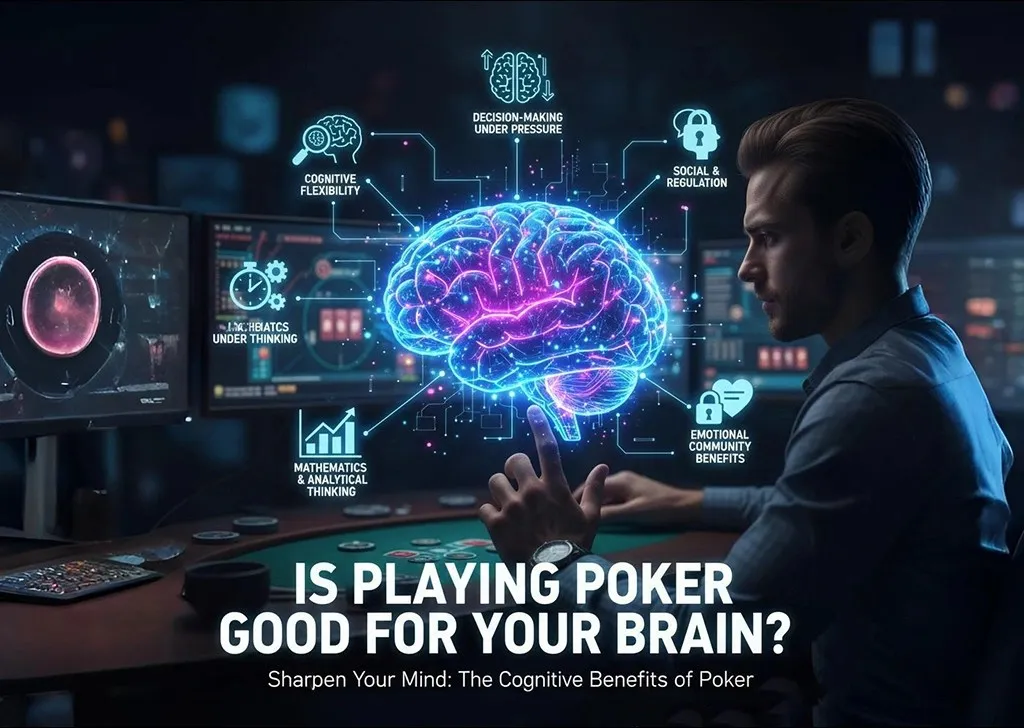
Poker has always been seen as more than just a card game. For many, it’s a source of entertainment, income, and even life lessons. But beyond the thrill of winning pots and reading bluffs, one big question often comes up: Is playing poker actually good for your brain?
The short answer: Yes, poker can sharpen your mind in multiple ways. From enhancing memory and decision-making to improving emotional control, poker has cognitive benefits that many people overlook. Let’s dive deeper.
Poker and Cognitive Flexibility
One of the strongest mental benefits of playing poker is cognitive flexibilit, the brain’s ability to adapt to new situations.
- In every hand, players must analyze incomplete information.
- They switch between aggressive and defensive strategies.
- They adapt based on opponents’ moves, stack sizes, and betting patterns.
This mental juggling trains the brain to think quickly and creatively. According to neuroscience research, games that require strategy + adaptability are excellent for keeping the mind sharp.
If you want to explore more about how poker challenges your thinking, check out this Club List of poker communities where you can practice with like-minded players.
Memory Improvement Through Poker
Poker is not just about luck; it requires remembering details. For example:
- What was the flop, turn, and river in the last hand?
- How did your opponent play in similar situations before?
- What bets have been made during the current hand?
This short-term memory recall is exercised constantly during play. Over time, it strengthens your working memory, the same skill you use in everyday life for tasks like problem-solving, learning new skills, and multitasking.
Decision-Making Under Pressure
Poker is essentially a decision-making laboratory. Every hand requires you to evaluate risk versus reward:
- Should you call, raise, or fold?
- What’s the probability of winning based on the cards?
- Is your opponent bluffing, or do they really have the nuts?
Learning to make fast yet calculated decisions under pressure improves critical thinking. This ability translates into real-life situations like business negotiations, investments, or even daily problem-solving.
For a fascinating perspective, read How Poker Teaches You More About Life Than School Ever Could.
Emotional Regulation and Patience
Poker is not always about winning, it’s about managing losses gracefully. This is where emotional intelligence (EQ) comes in.
- Losing a big hand teaches patience.
- Bad beats test your emotional control.
- Staying calm under pressure improves resilience.
Studies show that people who practice emotional regulation in games like poker are better at handling stress in real life.
Mathematics and Analytical Thinking
Poker is filled with math, whether players realize it or not.
- Calculating pot odds
- Understanding implied odds
- Estimating probabilities of winning hands
Even if you’re not a math lover, poker makes you apply numbers in fun, practical ways. This improves analytical skills, logical reasoning, and pattern recognition.
Long-Term Brain Health
Engaging the brain in challenging activities is often recommended for delaying cognitive decline. Poker, like chess or Sudoku, is a brain workout that:
- Stimulates different regions of the brain
- Enhances concentration
- Reduces the risk of age-related memory loss
Think of it as a fun way to future-proof your brain.
Goal-Setting and Discipline
Another hidden benefit of poker is the way it teaches discipline. Professional players follow bankroll management rules strictly.
If you’re curious about discipline in practice, the Micro Stakes Poker Bankroll Challenge shows how players can turn just $50 into $1,000 with careful planning and patience.
This kind of disciplined approach doesn’t just make you a better poker player, it helps in setting realistic goals in business, fitness, and life.
Social & Community Benefits
While poker is often seen as a solitary pursuit, it actually connects people worldwide. Playing in clubs, online platforms, or live tournaments builds social connections. These interactions stimulate emotional intelligence, teamwork, and cross-cultural communication.
And yes, building social networks is also linked to better brain health.
Online Poker & the Digital Edge
With platforms like Bluffing Monkeys making poker more accessible, today’s players can sharpen their brains from anywhere. Online platforms add extra challenges:
- Fast-paced games
- Multi-tabling (playing several tables at once)
- Tracking digital tells instead of physical ones
This pushes players to develop faster reflexes, stronger focus, and multitasking skills.
Final Thoughts: Poker as a Brain Gym
So, is playing poker good for your brain? The evidence says yes.
Poker is not only about money or luck, it’s about developing strategic thinking, memory, emotional control, math skills, and discipline. Think of it as a mental gym session where every hand strengthens your cognitive muscles.
Of course, like anything else, moderation is key. Playing responsibly ensures that poker remains a fun, brain-boosting hobby rather than a source of stress.
If you want to explore poker further, communities like Bluffing Monkeys are great places to start your journey.
FAQs
Q1: Can playing poker really make me smarter?
Yes. Poker trains skills like probability, decision-making, memory, and emotional regulation all of which improve mental sharpness.
Q2: Is online poker as beneficial for the brain as live poker?
Yes, though in different ways. Online poker improves speed, multitasking, and pattern recognition, while live poker enhances emotional reading and social intelligence.
Q3: Does poker help with stress management?
Absolutely. Poker teaches patience, discipline, and emotional control, which help in handling stress in real life.
Q4: How often should I play poker to see brain benefits?
Like any exercise, consistency matters. Playing a few sessions weekly can help maintain mental sharpness without burnout.
